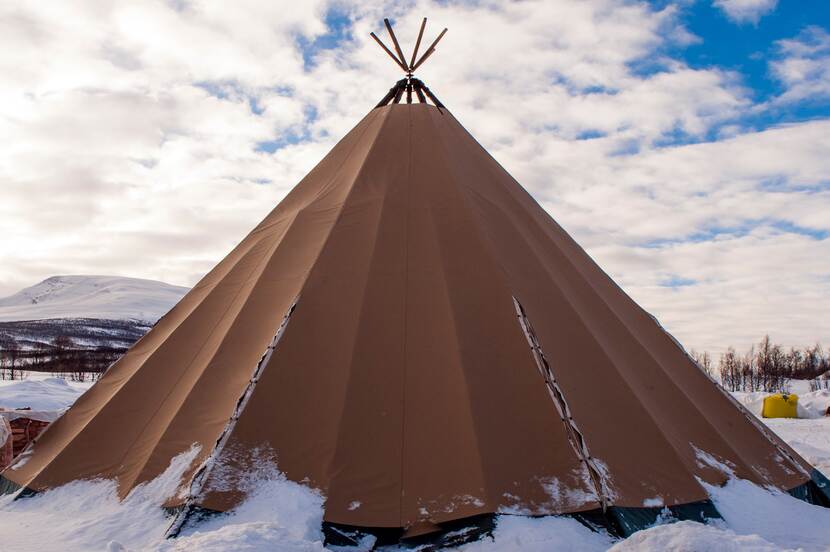Two Dutch projects awarded in international research programme
In 2022, the European network Joint Programming Initiative Cultural Heritage & Global Change opened the call 'Cultural Heritage, Society & Ethics'. This week, it was announced that six transnational research projects have been granted. Two of these projects involve researchers from the Kingdom of the Netherlands. The research themes of these two projects concern indigenous heritage of the Arctic and the history of the LGBTQIA+ community.

The projects in this call focus on the relationship between cultural heritage – tangible, intangible, digital and natural – and major societal issues. Two projects with Dutch researchers will receive funding: ArcHeritage and PERCOL
ArchHeritage will investigate the trade chains of three iconic heritage artefacts from the polar regions: reindeer antler, the conical tent, and mammoth and walrus ivory. Besides tracking oral history, it looks for new social and commercial developments and links them to historical lifestyles of herders and hunters.
The PERCOL project maps the growth of Europe's queer and trans archives, from the 1970s to the present. The aim is to provide scholars, members of the queer and trans community and GLAM (Galleries, Libraries, Archives, Museums) staff with a critical and nuanced understanding and to develop sustainable strategies for the protection of LGBTQIA+ history.
About the Cultural Heritage & Global Change JPI
For the Kingdom of the Netherlands, the Dutch Research Council (NWO) and the Cultural Heritage Agency of the Netherlands (RCE) (on behalf of the Ministry of Education, Culture and Science) participate in the Joint Programming Initiative Cultural Heritage & Global Change (JPI CH). Together, NWO and RCE contribute to the organisation, strategy and working methods of the JPI CH.
In light of global developments and shifts, the protection and preservation of Europe's cultural heritage is of great importance. This requires research across national borders. JPI CH encourages cooperation between national and international research groups in the field of cultural heritage. Since 2010, eighteen countries within the European JPI CH network have been aligning their research programmes in varying configurations.
Information on the awarded projects can be found below. All projects receiving funding within this call can be found on Heritage Research Hub.
More about ArcHeritage and PERCOL
ArcHeritage – Arctic Heritage: Commodification, Identity, and Revitalisation in the Anthropocene
Project leader: Richard Fraser, Arctic University of Norway (UiT)
Dutch PI: Maarten Loonen, Groningen University
Partners: Museum of Cultural History (Norway), Leiden Etnografisch Museum (the Netherlands), Arctic Studies Centre China
This project explores the commodity chains of three iconic heritage artefacts in the Arctic: reindeer antler, the conical tent, and mammoth and walrus ivory. It will trace the oral histories and new market and social entanglements of these artefacts across several sites in Sápmi, Canada, and Greenland, linking them to historical pastoralist and hunting lifeways and their transformation over time. In recent years, each artefact has taken a new form within the heritage and tourism industries: 1) reindeer antler as Traditional Chinese Medicine; 2) the conical tent as a fixed tourism dwelling; 3) and ivory as souvenir carvings. They thus tell a wider story of Arctic heritage and the relationship between indigenous producers, consumers, and the market. Our objectives are to research the transformation of the artefacts into heritage objects and their movement across national and international commodity chains.
PERCOL – Perverse Collections: Building Europe’s Queer and Trans Archives
Project leader: Glyn Davis, University of St Andrews
Dutch PI: Eliza Steinbock, Maastricht University
Partners (ao): Eye Filmmuseum (the Netherlands), Black Queer Archive (the Netherlands), Bishopsgate Institute (UK), Museo Reina Sofia (Spain), Háttér Society (Hungary), The Norwegian archive for queer history (Norway), Schwules Museum (Germany)
‘Perverse Collections’ (PERCOL) asks: how can a critical and nuanced understanding of the evolution of Europe’s LGBTQIA+ archives be used by scholars, queer and trans community members, and GLAM (Galleries, Libraries, Archives, Museums) sector workers to forge sustainable strategies for protecting LGBTQIA+ history? And in what ways might this have transformative potential for cultural heritage politics and policy more broadly? To this end, the project will map the growth of Europe’s queer and trans archives, from the 1970s to the present; it will comparatively explore the workings of these collections, including their relations to forms of state support, the understandings of LGBTQIA+ history they promote locally, nationally, and internationally, and the alternative models of archiving some embody.